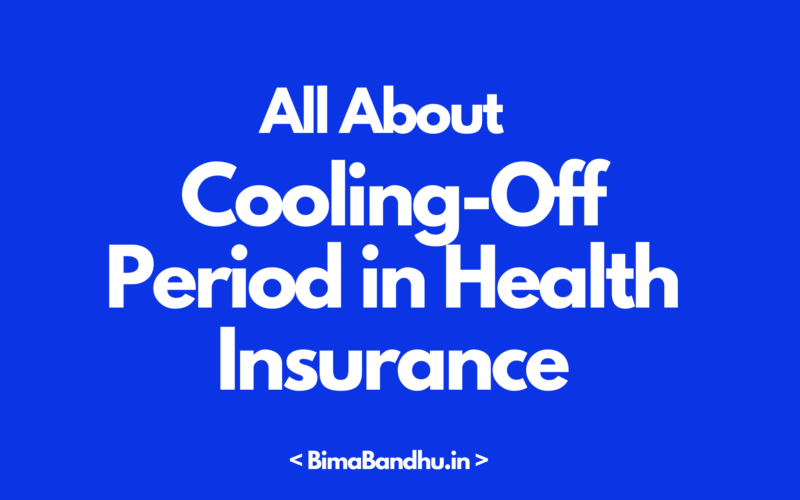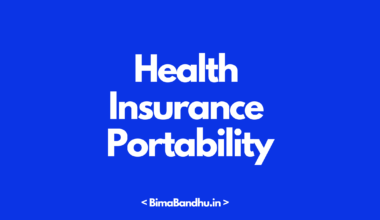In the unpredictable world of healthcare, safeguarding oneself against unexpected medical expenses has become a priority, especially in the wake of recurring health crises. If you get diagnosed with a severe disease and are still in the process of recuperating, the last thing on your mind might be purchasing health insurance. Yet it’s precisely in times like these that the importance of understanding the cooling-off period in health insurance becomes glaringly apparent.
The cooling-off period acts as a crucial safeguard, ensuring you don’t hastily make decisions about insurance coverage amidst the chaos of illness or injury. In this guide, we will cover the cooling-off period in health insurance, shedding light on its significance and how it can impact your healthcare decisions.
What is the Cooling-Off Period in Health Insurance?
Understanding the cooling-off period in health insurance is about safeguarding your well-being and financial security in times of uncertainty. So, let’s break it down in simple terms. It is the time frame typically lasting between 15 to 90 days, where you might need to focus on getting back on your feet before diving into health insurance decisions. It’s like pressing pause on the rush of paperwork and approvals, allowing you to prioritise your health without the added stress of insurance applications looming over you.
During this period, insurers hit the brakes on processing new applications from individuals still in the recovery phase. Why? Well, it’s a precautionary measure to ensure that when you do apply for coverage, you’re in a stable health condition. This helps keep the insurance system fair for everyone involved.
For you, a cooling-off period is like having an extra safety net. It means you won’t feel pressured into making hasty insurance choices while you’re still bouncing back from an illness or injury. Instead, you can take your time, assess your options, and make decisions that align with your health needs and financial situation.
Also Read: All About 50 Lakhs Health Insurance
Importance of Cooling-Off Period in Health Insurance
The cooling-off period in health insurance holds significant importance for policyholders, providing them with a crucial window of opportunity to review their insurance contracts and make informed decisions. Below are some key reasons why the cooling-off period is essential:
- Evaluation Time
The cooling-off period allows you to thoroughly review insurance policies, including terms, conditions, coverage limits, and exclusions. This evaluation period enables individuals to assess whether the policy aligns with their healthcare needs and financial circumstances.
- Correction of Errors
It provides an opportunity to identify any errors or discrepancies in the insurance contracts. During this period, you can rectify mistakes in coverage selections, personal information, or policy details, ensuring accuracy and completeness.
- Cancellation Flexibility
The cooling-off period also offers flexibility by allowing you to cancel insurance policies without facing penalties or financial repercussions. This flexibility is particularly beneficial if you find more suitable coverage options or reconsider your insurance needs shortly after purchasing a policy.
- Consumer Protection
The cooling-off period serves as a consumer protection measure, ensuring that you have adequate time to make well-informed decisions about health insurance coverage. It empowers you to exercise rights and make changes if necessary, enhancing transparency and fairness in the insurance industry.
- Peace of Mind
Knowing that you have a designated period to review and adjust insurance policies provides you with peace of mind. It alleviates concerns about making hasty decisions or being locked into unsuitable insurance contracts, promoting confidence and satisfaction with your insurance coverage choices.
You May Also Like to Read: All About Loading in Health Insurance
How Does Cooling-Off Period Work?
The cooling-off period in health insurance operates as a designated timeframe following the purchase of an insurance policy during which policyholders have the opportunity to reassess their decision and, if necessary, make changes or cancel their coverage without facing penalties. Here’s how the cooling-off period typically works:
- This period begins immediately upon the effective date of the insurance policy. This means that policyholders have a set period, usually ranging from 10 to 30 days, to evaluate their coverage and decide whether it meets their needs and expectations.
- During the cooling-off period, policyholders can carefully review the terms and conditions of their insurance contracts. This includes examining coverage benefits, exclusions, limitations, premium costs, and any additional features or riders attached to the policy.
- Policyholders may use this period to explore alternative insurance options available in the market. They can compare different insurance providers, policies, coverage levels, and premium rates to ensure they are obtaining the most suitable coverage for their individual circumstances.
- Based on their review and assessment, policyholders can make informed decisions about whether to retain, modify, or cancel their insurance policies. If they decide to cancel the policy during the cooling-off period, they can do so without incurring any penalties or financial consequences.
- To cancel the insurance policy during the cooling-off period, policyholders typically need to submit a written request to the insurance company. Upon receiving the cancellation request, the insurance provider will process the cancellation and refund any premiums paid by the policyholder, minus any applicable administrative fees.
Understanding the Contrast Between Cooling-Off Period and Waiting Period in Health Insurance:
It is essential for individuals to grasp the fundamental disparities between the cooling-off period and waiting period within health insurance policies. The cooling-off period signifies a critical time frame lasting typically between 15 to 90 days post the onset of an illness.
Conversely, the waiting period comes into effect following the procurement of a health insurance policy, lasting typically between 15 to 60 days. Throughout this period, policyholders are ineligible to initiate any claims under the insurance policy. Understanding this distinction is imperative as it underscores the importance of maintaining consistent coverage and prevents immediate claim submissions post-policy acquisition.
While some insurance providers may synonymously use terms like “initial waiting period” or “free-look period” interchangeably with the cooling-off period, comprehending the nuances between these terms is crucial for ensuring comprehensive knowledge of health insurance policies.
Importance of Minimum Cooling-Off Period in Health Insurance
A critical component that demands attention while buying health insurance is the minimum cooling-off period. This timeframe, typically spanning 15 to 30 days, signifies the shortest duration after a specific event – like the onset of an illness – within which purchasing health insurance is restricted.
By acknowledging the minimum timeframe required for cooling-off periods, individuals can strategically time their insurance purchases, ensuring prompt access to coverage and protection against unforeseen health issues. Moreover, recognizing the significance of the minimum cooling-off period empowers individuals to evaluate the urgency of their insurance needs and proactively align their purchase decisions with their health circumstances.
FAQs
Does the cooling-off period apply when renewing health insurance?
No, there is no cooling-off period during health insurance renewal, provided there is no break in policy coverage after expiry. Renewal typically occurs seamlessly without the need for a cooling-off period, ensuring continuity of coverage for policyholders.
Can a health insurance plan have both a cooling-off period and a waiting period?
Some health insurance plans do include both a cooling-off period and a waiting period. Think of it like this: the cooling-off period gives you time to recover from any recent illnesses before buying the policy, while the waiting period kicks in after you’ve purchased it, during which certain claims might be restricted. It’s like navigating through different stages of coverage. To be sure about the specifics, it’s always a good idea to chat with your insurer before making any decisions.
Can I hide my health conditions to skip the cooling-off period?
Being honest about your health is crucial when it comes to insurance purchase. If you’re caught hiding medical information, your insurance could be revoked permanently. It’s better to be upfront about your health status, ensuring you get the coverage you need without any surprises down the road. Remember, transparency builds trust with your insurer.
Read BimaBandhu’s Insurance Guides
Disclaimer:






